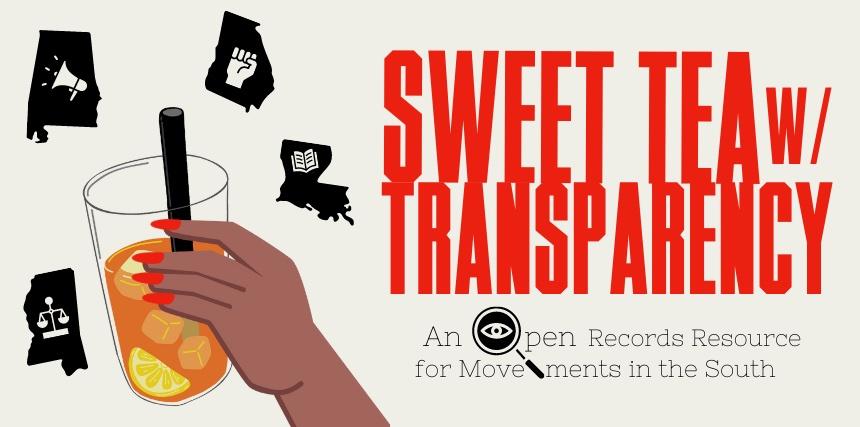What are Southern political elites up to? We know the broad outlines: they’re funding racist police squads, protecting their own power, helping corporate donors get even richer while entire cities face environmental crises and crumbling infrastructure. Yet they try to conceal the damning details – the evidence of their corruption, immorality, and illegality – from the public.
What vital information have they buried in state bureaucracies, “lost” in a backroom file cabinet, or attached to an email?
These telltale records don’t have to stay hidden. To celebrate Sunshine Week, we’re unveiling a new resource: Sweet Tea with Transparency: An Open Records Resource for Movements in the South. It’s a series of toolkits for activists, advocates, organizers, and community members interested in obtaining public records from state government agencies and officials in Alabama, Georgia, Mississippi, and Louisiana. The resource combines simple, easy-to-follow guides with examples of annotated versions of actual open records requests that we and our partners have filed in recent years.
We are launching the toolkits as a joint project of our Southern Regional Office – which is the strategic hub of our Southern Justice Rising initiative, our deepened, renewed institutional commitment to liberatory movements in the South – and our Open Records Project – our longstanding national effort to help allies use the Freedom of Information Act (FOIA) and other public records laws in their struggles for social change. Records requests can be extremely useful tools for advocacy, litigation, and organizing campaigns.
By uncovering government information, community groups can arm themselves for political and legal battle against powerful interests. These include corporations and ultra-rich individuals, because their sordid involvement with political officials often leave residue in public records. In recent months, we’ve teamed up with allies to seek info about ICE’s “Citizen Academies,” collusion between government officials and Elon Musk’s SpaceX, and Israel’s blocking Palestinian-Americans from entering the country. Meanwhile, records we’ve secured have exposed U.S. officials’ racist views of Black migrants.
What’s needed to access government records, beyond know-how, is patience and persistence, as government officials are likely to stonewall and turn over redacted documents. Even these, however, can be valuable. In 2017, redacted documents that we obtained with Color of Change nevertheless confirmed that the feds were spying on Black activists.
The new toolkits for our Southern allies are an extension of our resource, FOIA Basics for Activists. FOIA is only for federal agencies, but each state has a freedom of information – or open records – law. While these laws are all grounded in the same principles, the processes for using them vary. Sweet Tea with Transparency provides individualized guides for each of the four Southern states.
The toolkits are also a representation of our commitment, through Southern Justice Rising, to strengthen the defense of our Southern partners, support the advancement of movement goals, and amplify stories of resistance and the righteous pursuit of Justice – a commitment that began with our founding. We believe this new resource will amplify the power our partners and allies as they fight for justice in the face of opposition from Southern politicians and affiliated corporations whose penchant for secrecy often necessarily matches their proclivity for corruption.
During our recent work in the South, we’ve seen the value of public records requests. For example, in Louisiana – where our partner Rise St. James is attempting to stop the corporate behemoth, Formosa, from building a plastics factory on land containing burial sites of enslaved people – disclosed emails revealed that executives discussed secretly removing graves. We’ve also submitted public records requests to the Louisiana Division of Archaeology seeking information about the sites.
As the saying goes, information is power. It can help social movements build strength across the South, and we’re looking forward to supporting them as they do just that.
Please join the Center for Constitutional Rights on March 28, 7pm EST, for a webinar with staff from our Southern Regional Office and Open Records Project to learn more about Sweet Tea with Transparency.
Emily Early is the associate director of our Southern Regional Office
Ian Head is a senior legal worker and coordinator of our Open Records Project
Jessica Vosburgh is a senior staff attorney


